Executive Summary
The rapid advancement of Artificial Intelligence (AI) has sparked significant interest and debate across various sectors, including education. In the realm of special education, AI holds the potential to enhance traditional practices by offering innovative teaching and learning tools.
This 2024 national survey study aimed to explore the perceptions of special education leaders regarding the integration of AI within special education. By understanding their views, the study seeks to identify both the opportunities and challenges that AI presents, providing a comprehensive overview of its potential impact on special education.
Special education leaders play a crucial role in shaping the educational experiences of students with diverse learning needs. Their insights into AI’s capabilities, limitations, and ethical considerations are invaluable for guiding its implementation in special education settings. This study explored the perceptions of over 500 special education leaders — how AI might support learning, reduce administrative burdens, and improve accessibility for students with disabilities. Special education leaders also shared concerns of AI related to data privacy, the need for AI literacy, and the importance of maintaining human interaction in educational processes. By capturing a broad spectrum of opinions, this survey aims to contribute to the ongoing discourse on the role of AI in special education, ultimately informing policy and practice.
Key Findings
The summary of findings from the national survey of special education leaders, representing over 500 respondents, presents a current snapshot of leader perceptions of AI potential and utilization alongside perceived challenges and concerns currently held within the 2023–24 school year. The survey then further probed perceived anticipations of special education leaders in the upcoming 2024–25 school year.
Special education leaders’ responses represented diverse geographical backgrounds, including urban, suburban, and rural locales. Special education leaders representing an urban (30%) or suburban (30%) district context accounted for 60% of responses, followed by 40% from leaders representing a rural district context.
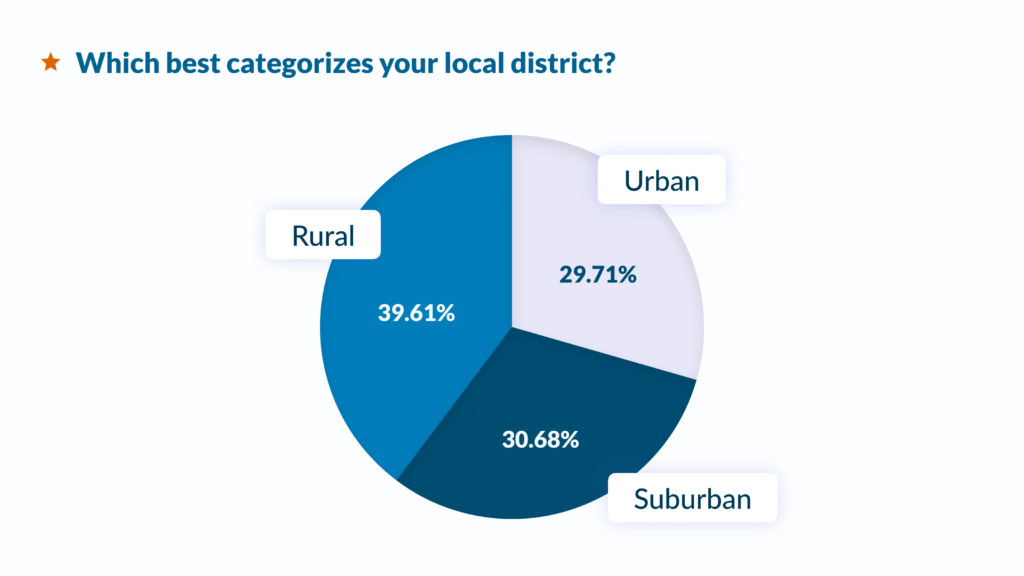
AI and Special Education Priorities
The challenges confronted by special education leaders reflect the complex and multifaceted nature of managing special education programs and the need for effective strategies to address them.
Special education leaders reported their top three priorities addressed within the 2023–24 school year as 1) Process and compliance (72%); 2) Student behavior and discipline issues (56%); and 3) Staffing shortage/retention (50%).
These top three priorities were followed by data-based decision-making (43%), inclusion (29%), mental health of students and staff (25%), and curriculum or instructional professional development (20%).
Overall, AI in special education was the lowest priority (< 2%). This is likely an indicator that AI, in and of itself, may not be a priority for special education leaders, especially at this time.
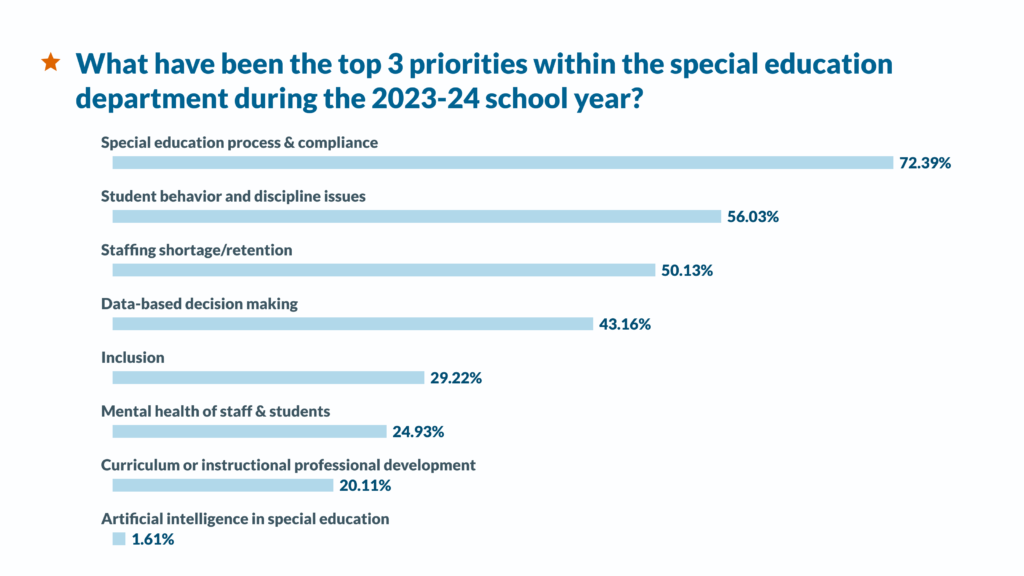
The survey also probed the anticipated importance of AI for special education leaders as either a top priority or of general importance within special education in the upcoming 2024–25 school year. Responses varied regarding AI significance for the upcoming school year.
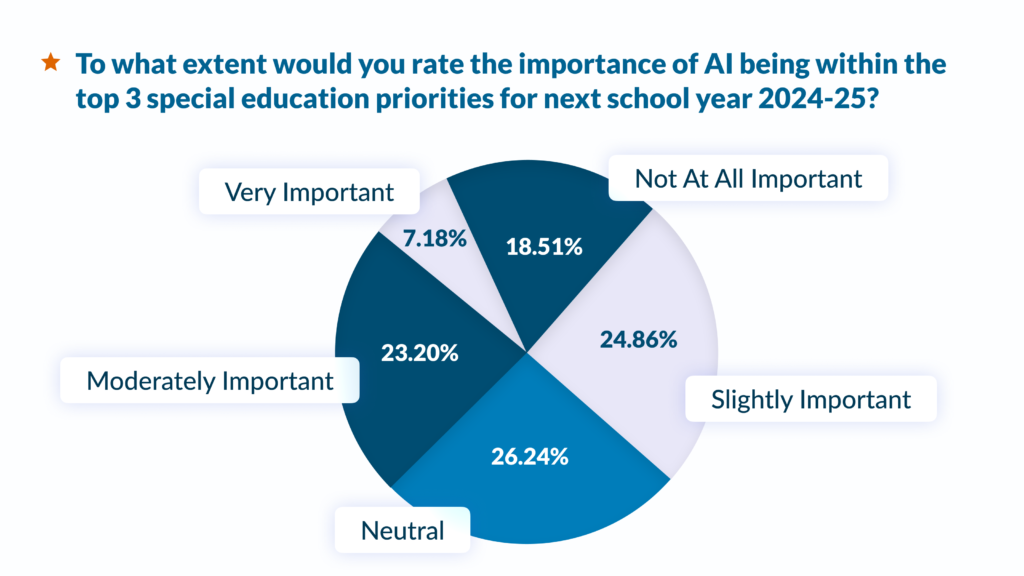
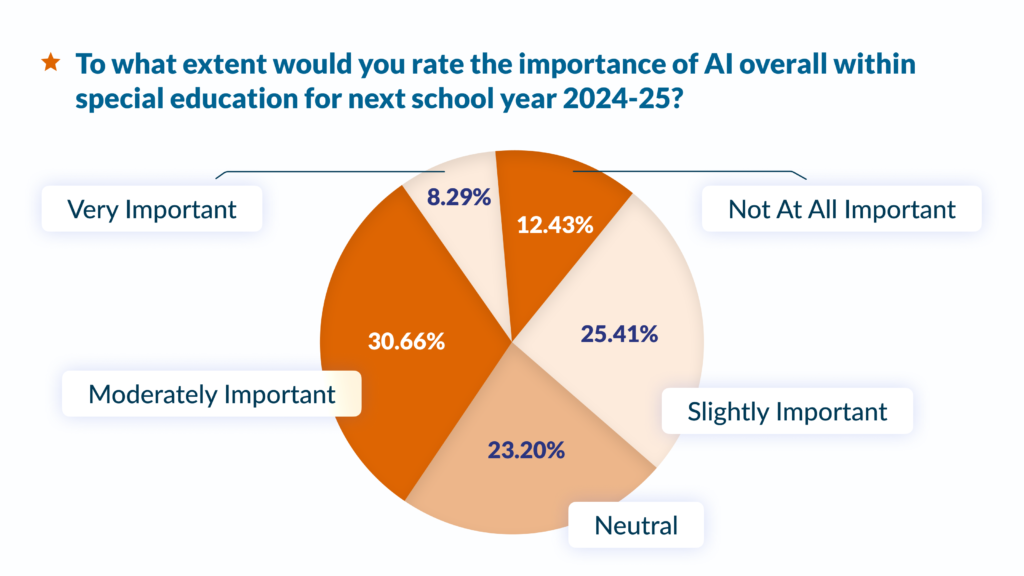
District and Special Education AI Policy
Additionally, the survey investigated the existence of a district policy regarding AI usage. A small share of respondents (11%) shared their district does have a policy regarding AI usage. The majority (65%) said their district does not have a policy regarding AI usage, while a notable number (24%) expressed they were not sure.
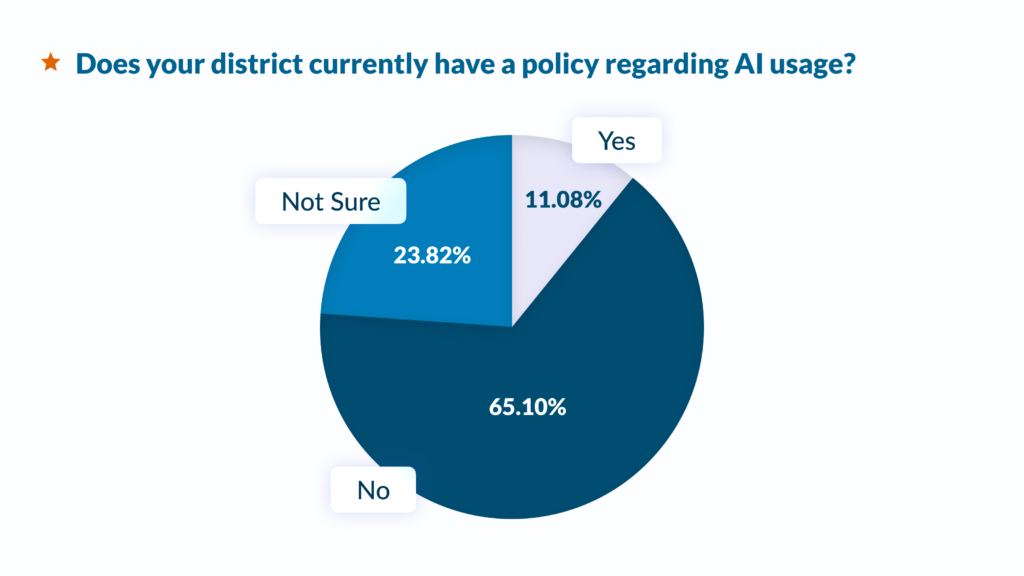
For respondents who shared their district does have policy regarding AI usage (11%), a follow-up question further probed whether the district AI policy provided specific guidance for special education, highlighting a potential gap that would benefit from special education leadership. The majority (67%) expressed their district AI policy does not provide specific special education guidance. Overall, 60% of respondents anticipate needing a policy specific for AI usage within special education, while over 30% expressed uncertainty.
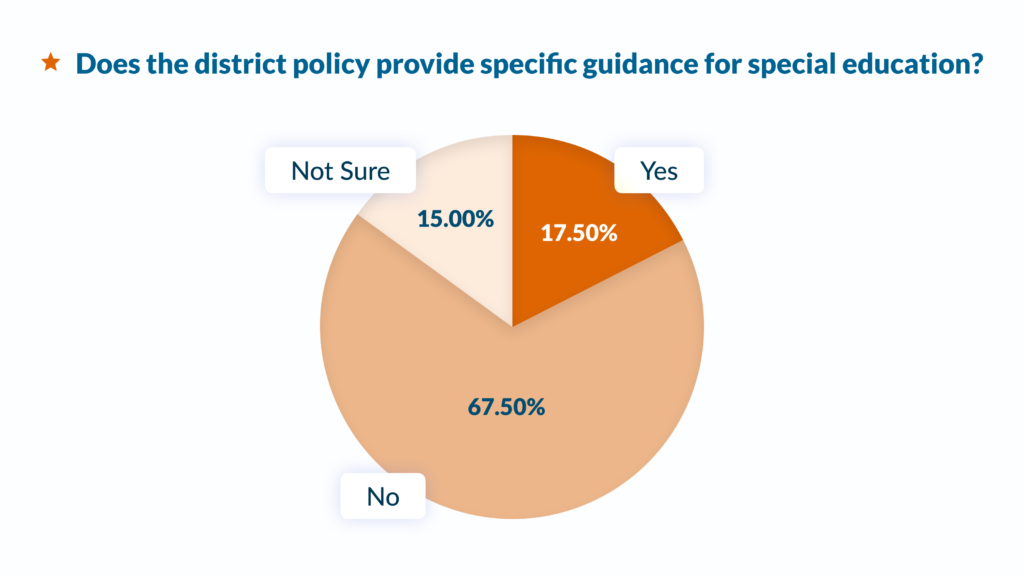
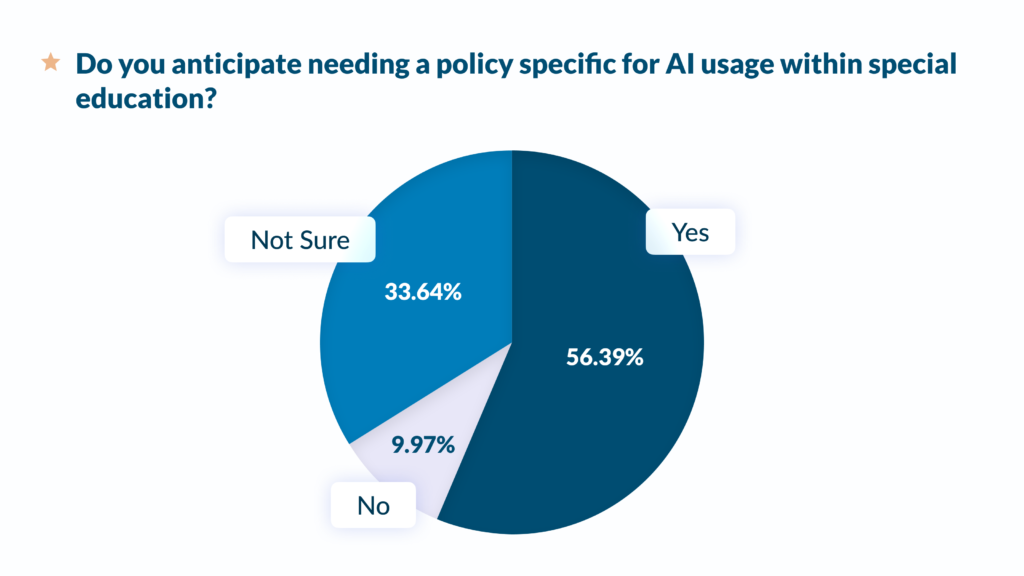
Responses suggest many districts do not have a policy regarding AI usage or that policy is unclear. This lack of clear policy and guidance could hinder the structured and safe integration of AI in special education. Special education leaders voiced their anticipation of needing AI-specific policies within special education, which suggests that as awareness and understanding of AI grow, more structured approaches to its integration are likely to develop.
Potential Benefits of AI in Special Education
Special education leaders’ perceptions on AI’s impact in special education are mixed. For example, some believe it may improve outcomes, while others are unsure or foresee no significant impact.
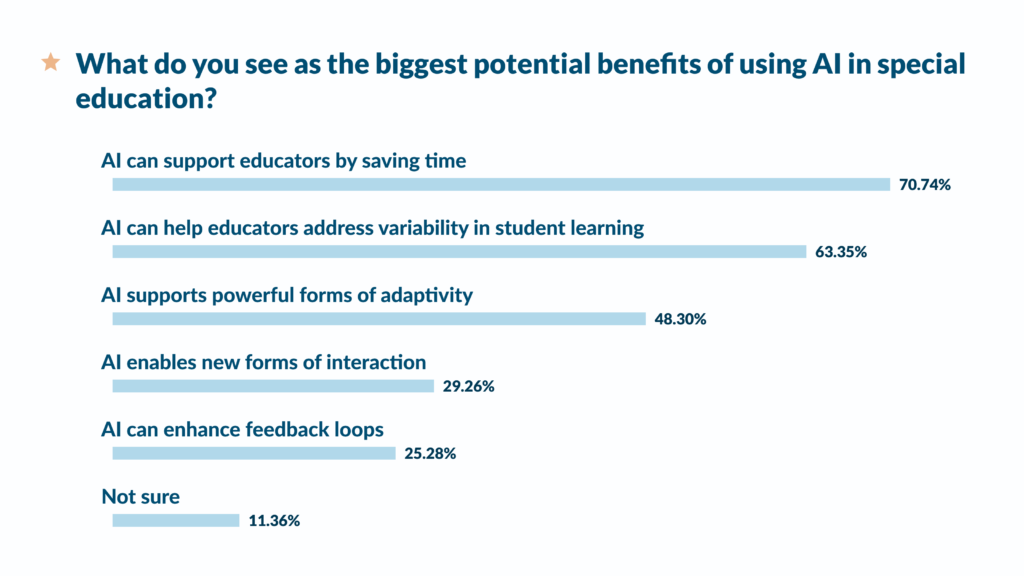
Responses from special education leaders suggest AI could support special education, focusing on enhancing accessibility, simplifying administrative tasks, and improving individualized services. Additional qualitative responses shared by special education leaders highlight potential benefits of integrating AI in educational settings for students with special needs.
The following themes were identified from qualitative responses:
Accessibility and Engagement
AI might increase access to educational materials and engagement for students with special needs by:
- Generating instructional materials at various reading levels.
- Providing accommodations and modifications to help students access grade-level content.
- Helping students with disabilities interact with their peers and access the same content.
“Increase the ability to level the playing field for our students.”
“AI can assist special education teachers who are not content experts to adapt and modify curriculum assignments.”
Simplification of Administrative Tasks
AI might streamline the workload for educators by:
- Assisting with paperwork and report writing.
- Helping match students with interventions based on learner characteristics.
- Enhancing the efficiency and consistency of IEP documentation.
“I appreciate AI for assistance in responding back to emails; it is a huge time saver. It helps me generate ideas as a district level leader.”
Individualization of Services
AI might improve the individualization of educational services by:
- Supporting the creation of developmentally appropriate activities.
- Offering new ways to approach student needs creatively while maintaining compliance.
“Creating specific graphics for representation of race, gender, culture, mobility aids, etc.”
Overall, the responses emphasize the potential for AI to support special education by making educational content more accessible, reducing administrative burdens, and enhancing the personalization of services for students with special needs.
Concerns of AI in Special Education
The survey further probed special education leaders to identify their concerns about AI. Responses highlight potential negative impacts on students and staff, the need for policy development, and the challenges of effectively incorporating AI into teaching and administrative practices.
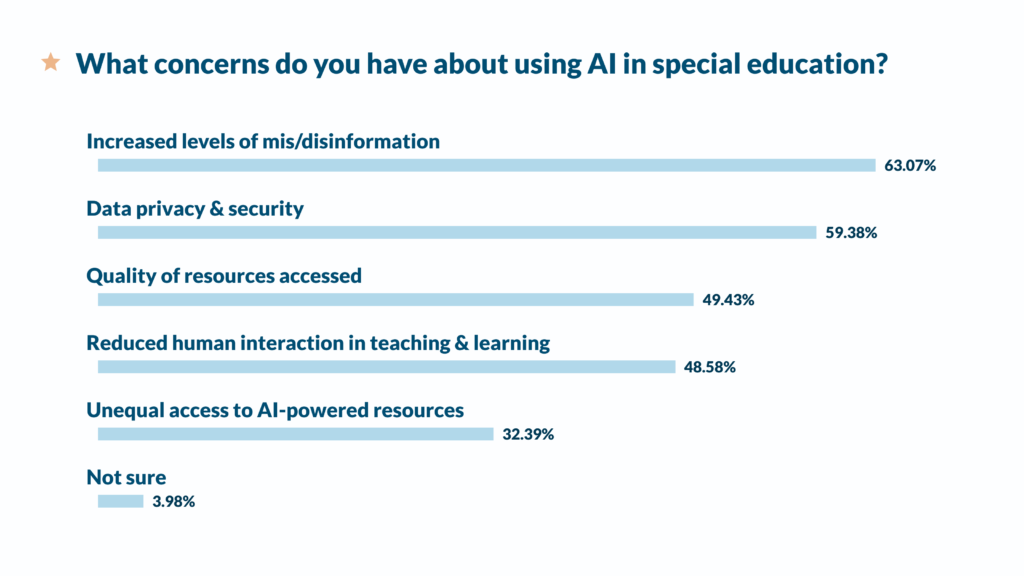
The top concerns of AI expressed by special education leaders were 1) Increased levels of misinformation and disinformation (63%); 2) Data privacy and security (59%); followed by 3) Quality of resources accessed and Reduced human interaction in teaching and learning. A small percentage (4%) voiced being not sure of their concerns.
Respondents were encouraged to also provide qualitative responses to express their current concerns of AI. The following themes were identified from the analysis of the qualitative responses shared:
Academic Integrity and Student Learning
- Concerns about students relying on AI for answers rather than learning the process.
- Potential for compromised academic integrity and increased plagiarism.
- Risk of decreased independent thinking and reduced competency among students and staff.
“Districts will find it necessary to establish their own policies around the use of AI, in an attempt to ensure authentic student work product. These policies will greatly impact adults’ ability to leverage AI responsibly.”
Policy and Ethical Considerations
- Necessity for districts to establish policies to ensure authentic student work.
- The importance of oversight, management, and ethical guidelines in AI programming.
- Issues related to privacy, data security, and the potential misuse of AI.
“I think that people (staff and students) need to clearly understand that AI is a support tool but content has to be explicitly reviewed for accuracy and quality and that it is not meant to complete your work but rather assist in timeliness, clarity, and support.”
Impact on Educators and Individualization
- Challenges for educators in learning to use AI effectively.
- Risk of AI reducing individualization in special education and other personalized learning contexts.
- Concerns about educators over-relying on AI, potentially leading to a decrease in human interaction and attention to individual student needs.
“Teachers using AI when responding to parents and students that does not support the need for differentiation and allows teachers to not pay attention at the human level that is often lost when you don’t have to read and respond carefully.”
“AI is essentially new/untested. It is unclear as to whom may have access to sensitive information. I also worry about degenerative feedback loops with AI and staff relying on it without being critical/having a critical focus on what the output is.”
The integration of AI in educational settings presents an array of challenges and opportunities that must be carefully navigated. Key concerns include maintaining academic integrity and fostering independent thinking among students, which are at risk due to potential over-reliance on AI for answers. Additionally, the development and enforcement of robust policies are crucial to ensure ethical use and protect privacy, while also addressing the need for proper oversight and management. Lastly, the impact on educators and the risk of diminished individualization in teaching highlight the necessity for comprehensive training and a balanced approach to AI utilization, ensuring it serves as a supportive tool rather than a replacement for personalized education and human interaction.
AI Evolution for Special Education
While some special education leaders perceive that AI has the potential to improve student outcomes (38%), other views are nuanced and cautious. Over one-third of special education leader respondents (33%) shared they are not sure how AI will influence student outcomes, and another 22% believe there will be no significant impact on student outcomes, followed by 6% who perceive AI will hinder student outcomes.
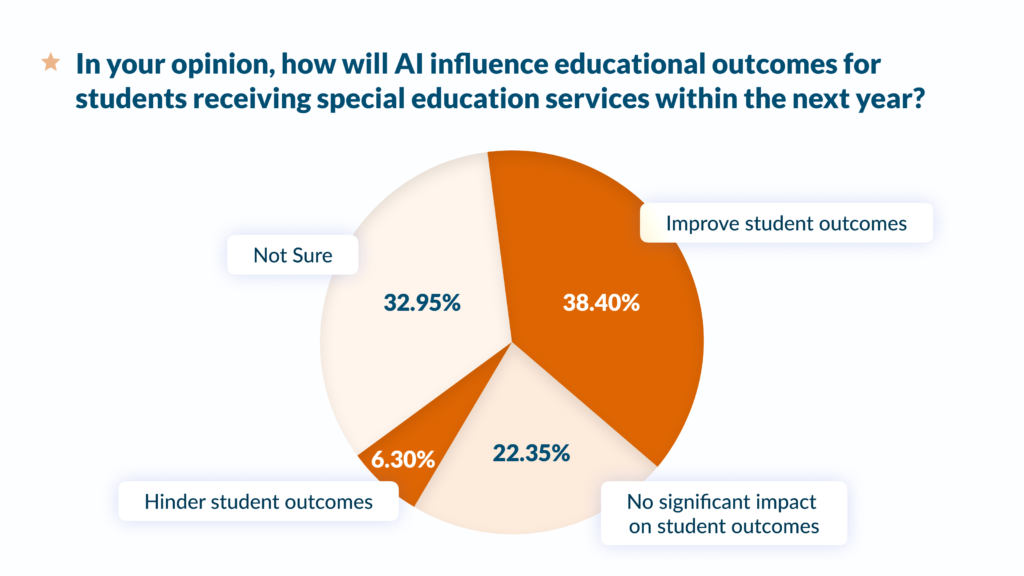
But what about how special education leaders envision AI in special education in the next five years?
Most special education leaders (61%) perceive AI will be used more widely in special education but not as a central component, while 16% shared they are not sure how AI will be used in education.
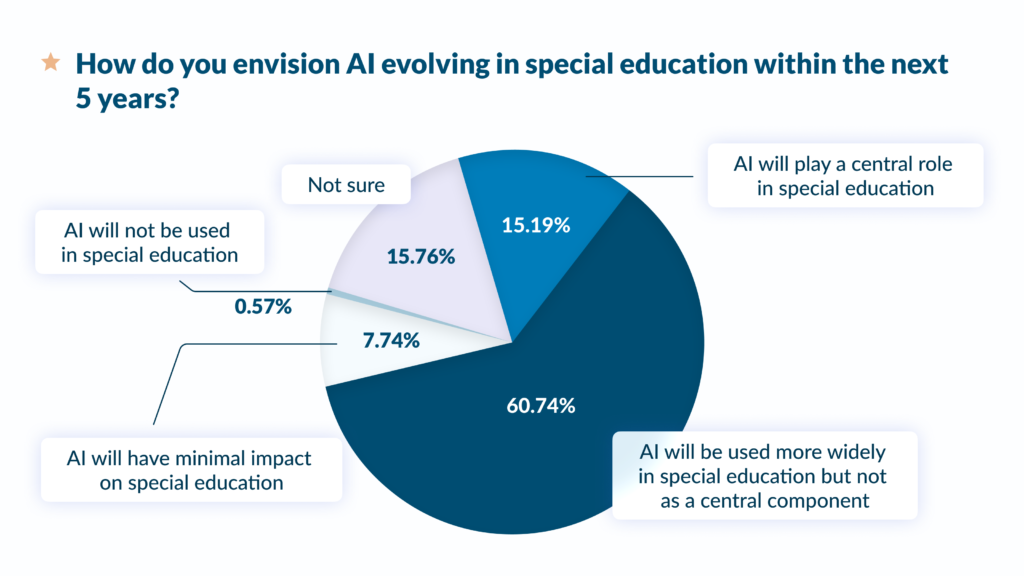
AI Preparedness of Special Education Leaders
The majority of special education leaders (60%) feel either not prepared or uncertain in leading their districts’ AI strategy related to special education starting in 2024–25. Addressing the gaps in training, policy, and support could help leaders harness the full potential of AI to benefit students with special needs as well as the community of practice.
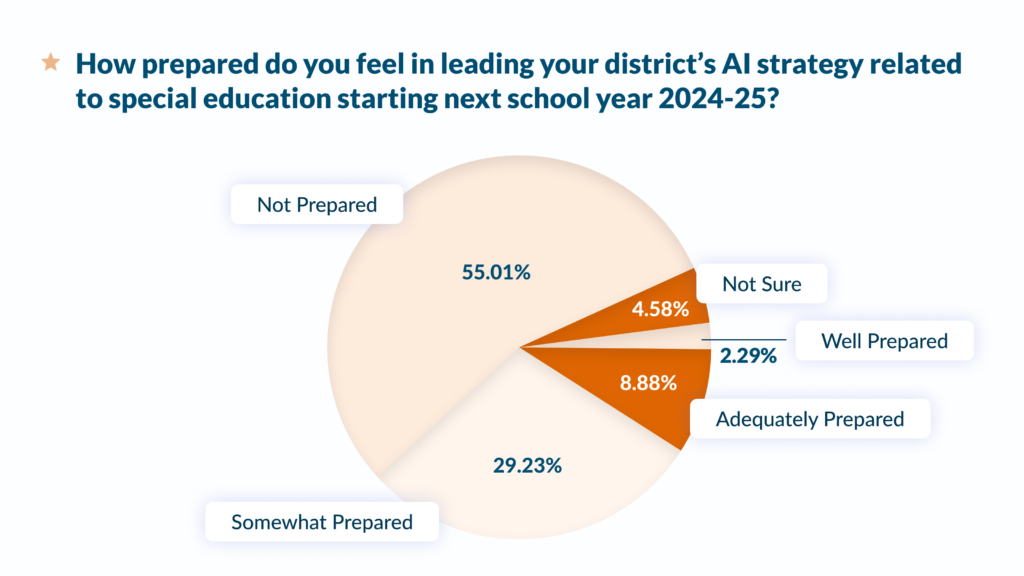
While several respondents (60%) shared at least one example of how they have used AI in their practice as special education leaders in 2023–24, a notable 40% shared they have not nor will not use AI in their practice.
The use of AI within special education and by special education leaders will undoubtedly continue to evolve. Ensuring special education leaders have meaningful resources and guidance will be critical to how AI Effective leadership will be crucial to the successful integration of AI. Leaders who are well-prepared and knowledgeable about AI are better-positioned to advocate for its benefits, address the concerns, and implement policies that facilitate its adoption.
Closing
In summary, the varying perceptions of AI in special education create a complex landscape for its adoption and integration. While recognized benefits may drive interest, significant concerns and a lack of clear policies and preparedness hinder widespread adoption. Addressing these perceptions through education, policy development, and leadership support is essential for the effective integration of AI in special education.
The findings from this national survey study, collected from over 500 respondents, underscore the complexity of AI within special education. Special education leaders recognize the transformative potential of AI to enhance personalized learning, streamline administrative tasks, and improve accessibility for students with disabilities. However, they also expressed significant concerns regarding data privacy, the ethical implications of AI use, and the necessity of maintaining human elements in educational interactions. These insights highlight the need for balanced and informed approaches to AI adoption, ensuring that technological advancements are harnessed responsibly and effectively to support the diverse needs of students. As policymakers and educators move forward, the perspectives of special education leaders will be crucial in shaping strategies that maximize the benefits of AI while addressing its challenges, ultimately fostering a more inclusive and equitable educational environment.
This report brings to light a comprehensive view of the perceptions of special education leaders about AI gleaned from a national survey aimed at understanding the current state and future perspectives of AI utilization within special education. The survey addressed several key areas, including the challenges faced by the community of practice, the top priorities within special education, and the varying perceptions of AI in the field. Addressing these issues through targeted strategies may improve the special education process, ensure compliance, and facilitate the effective integration of AI technologies, increasing our collective potential to empower educators to transform instruction so that all students succeed.
Goalbook is committed to ongoing research and evaluation to deepen our collective understanding of how to improve instructional outcomes and promote continuous improvement.
Click HERE to learn more about the research studies on Goalbook Toolkit.







